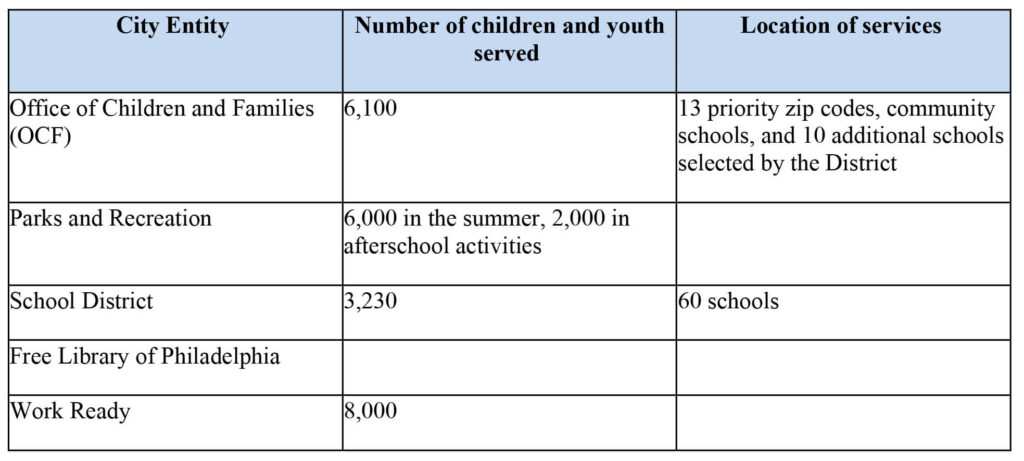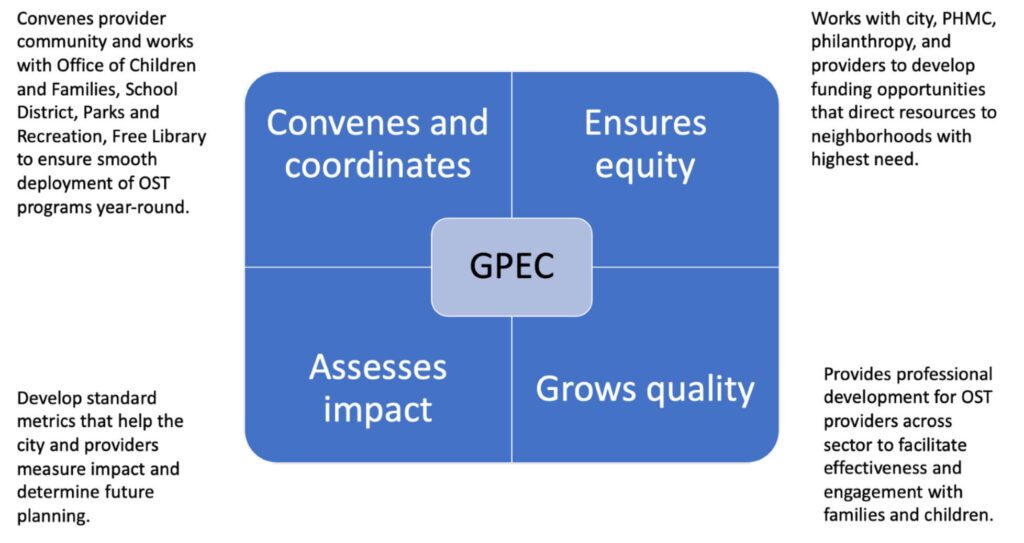Philadelphia has an incredible resource that any city administration has yet to fully tap for the city’s 322,000 children. In neighborhoods, schools, recreation centers and libraries across the city, hundreds of caring adults support the learning and development of youth in afterschool and summer programs — out-of-school time (OST) programs, for short — that young people love and parents trust.
Extensive research shows that engagement in OST programs yields significant benefits. Children and youth perform better in school, gain valuable work experiences, develop socioemotional skills, and are more likely to complete high school. Parents feel good at their jobs because they know their children are safe and supported while they are at work. In other words, OST programming is a way to improve educational outcomes, create economic opportunity, and make neighborhoods safe.
Yet, only 25,330 of our kids participate in afterschool, summer programs, or youth employment tied to the City of Philadelphia. That is less than 10 percent of our kids!

Children and families want and need more OST activities. The good news: There are ample OST providers ready to meet the demand. With strategic investments, an eye towards citywide coordination and strong leadership, the next mayor can grow the number of youth served, make better use of existing resources and prepare young people for exciting futures.
Learning from the best: Los Angeles and Boston
Los Angeles and Boston are national models for how cities can leverage OST programs to address deep-seeded inequity. Students in Los Angeles’ OST program are less likely to commit juvenile crime and more likely to finish school. They also become mentors and community leaders, often returning to work in the same OST program that nurtured them.
To increase access and to improve the quality and coordination of extracurricular programming, the mayor must stimulate public and private partnerships to support the expansion of OST opportunities for children and youth.
Boston’s OST programs have closed the academic achievement gap between wealthy and high-needs neighborhoods. Their students participate in a nationally recognized summer program that affords students opportunities to continue learning and engage local universities, cultural institutions, and businesses — all while having fun.
Behind these accomplishments are solid OST intermediaries, entities with strong government backing who are tasked with building a vibrant sector that coheres around common frameworks, best practices and a desire for large-scale planning. Such intermediaries:
-
- Convene leadership in government, business, philanthropy and the provider community with the purpose of improving the quality of programs and expanding access to families.
- Leverage separate funding streams to support programs that meet shared citywide goals.
- Ensure disparate stakeholders are lock-step in the implementation of programs.
- Unify metrics for need and success.
- Train OST providers in cutting-edge practices to deliver the best possible programming.
National experts point to intermediaries as key to vibrant OST systems.
L.A’.s Best: how OST intermediaries improve sector quality
With the mission to “provide a safe and supervised afterschool education, enrichment, and recreation program for children ages 5 to 12 in Los Angeles,” L.A.’s Best offers free academic year and summer programming to 25,000 students in 200 schools in neighborhoods with the fewest supports and greatest need.
Throughout the school year, L.A.’s Best students have nutritious meals, homework help, and the chance to participate in enrichment activities that include in STEM, literacy, the arts, sports, health, and wellness. L.A.’s Best seven-week summer programs mirror the academic year, operating out of elementary schools, Monday to Friday to 6pm, incorporating activities and field trips that promote experiential learning.
L.A.’s Best provides professional development to staff, including management, self-esteem and self-leadership trainings — and online resource hubs for sharing information, innovation and insight.
This emphasis on professional development allows L.A.’s Best to recruit from the communities they serve. More than 2,000 of L.A.’s Best staffers draw from the programs’ surrounding communities; 25 percent are program alumni. Post-pandemic, L.A.’s Best trained all staff on trauma-informed care and helped staff incorporate socio-emotional learning in activities.
Boston Beyond: How OST intermediaries can boost academic performance through partnerships in government and a school district
Founded in 2005, the OST intermediary Boston After School & Beyond serves as the hub for Boston’s OST ecosystem, working closely with the mayor’s office and school district to create a broader safety net to close the academic achievement gap. By convening government and school leaders, businesses, philanthropists and providers around common goals, clear roles and a programmatic timeline, Boston Beyond has leveraged over 300 programs and schools in their network in order to bring afterschool and summer learning opportunities to over 20,000 students annually. They have also established standard metrics to both guide provider work and measure collective impact.
Boston Beyond’s “fifth quarter program,” Summer Learning for All, is especially notable. In 2010, they partnered with Boston Public Schools to launch an effort to turn the city into a classroom that reinforced key college- and HR-identified skills.
Boston Beyond gathered input from the city and school administration on need, leveraged philanthropic partnerships for funding and helped programs, and gained access to hands-on learning opportunities from universities, museums and employers. They also introduced a partner portal to collect common data points: student profiles, participation rates, and staff and student surveys.
In 10 years, Summer Learning for All grew to serve more than 15,000 students in 160 programs and expanded to expressly address the needs of special education students. Summer Learning for All now replaces traditional summer school for the city. The National Summer Learning Association has called it a national model.
Build Philadelphia’s public-private partnership to expand youth opportunity
Here in Philadelphia, we have the pieces to create a coherent OST system. We just lack the coordination with a common agenda. No less than five city agencies administer extracurricular programing for children and youth:
-
- Office of Children and Families (OCF)
- Parks and Recreation
- Free Library of Philadelphia
- School District of Philadelphia (multiple offices)
- Work Ready via Work Ready intermediary
To increase access and to improve the quality and coordination of extracurricular programming, the mayor must stimulate public and private partnerships to expandOST offerings.
Currently, the City’s Office of Children and Families allocates prevention dollars to fund OST seats. Because those funds are far too limited to meet the need, the mayor must direct the maximum amount of prevention funds — and augment those funds with general fund dollars.
Even then, more funding is needed. The mayor must encourage a public and private partnership in the form of an OST intermediary. Of the combined federal, state, city and private $6.4 million investment in L.A.’s Best, $3.9 million provides capacity building services, training and support for the OST community, and $2.5 million covers administrative operations.
Leverage city and school facilities for afterschool, evening, and summer programming
A sound way to increase OST access: Make sure the city’s youth-friendly spaces — recreation centers, libraries, and schools — offer both ample programming and hangout space. Schools, in particular, can be open from 7:30am to 6pm and during breaks.
Philadelphia can do the same, if not more
The Greater Philadelphia Extracurricular Collaborative (GPEC) is uniquely positioned to build the intermediary.

GPEC is a network of OST providers and supportive funders working to build a robust OST sector in and around Philadelphia. Founded at the onset of the Covid pandemic, GPEC moved quickly to convene OST providers to share information and best practices. Since then, GPEC has continued in this vein and organized events such as funder meet-and-greets to help build provider capacity.
Essentially, GPEC works with all providers, regardless of their funding or areas of specialty, understanding a robust OST system requires diverse perspectives.
As a permanent entity, a qualified intermediary can reverse the on-and-off nature of the city’s past system-building efforts, providing stability so that relationships grow, timelines and stakeholder meetings are consistent, and long-term projects take root, grow and continue long after any one mayoral term. Engaging GPEC to do this essential work would not just help Philadelphia students in the short-term: It would be part of a legacy.

Laura Johnson is deputy executive director of Sunrise of Philadelphia. Beth Devine is executive director of Philadelphia Youth Sports Collaborative. Shira Hodges, is executive vice president of the Philanthropy Network Greater Philadelphia.
The following groups contributed to the writing of the memo: After School Activities Partnership, Greater Philadelphia Philanthropy Network, Greater Philadelphia YMCA, Norris Square Neighborhood Project, North 10, Play On Philly, Philadelphia Youth Sports Collaborative, and Sunrise of Philadelphia.
![]() MORE MEMOS TO MADAM MAYOR
MORE MEMOS TO MADAM MAYOR



